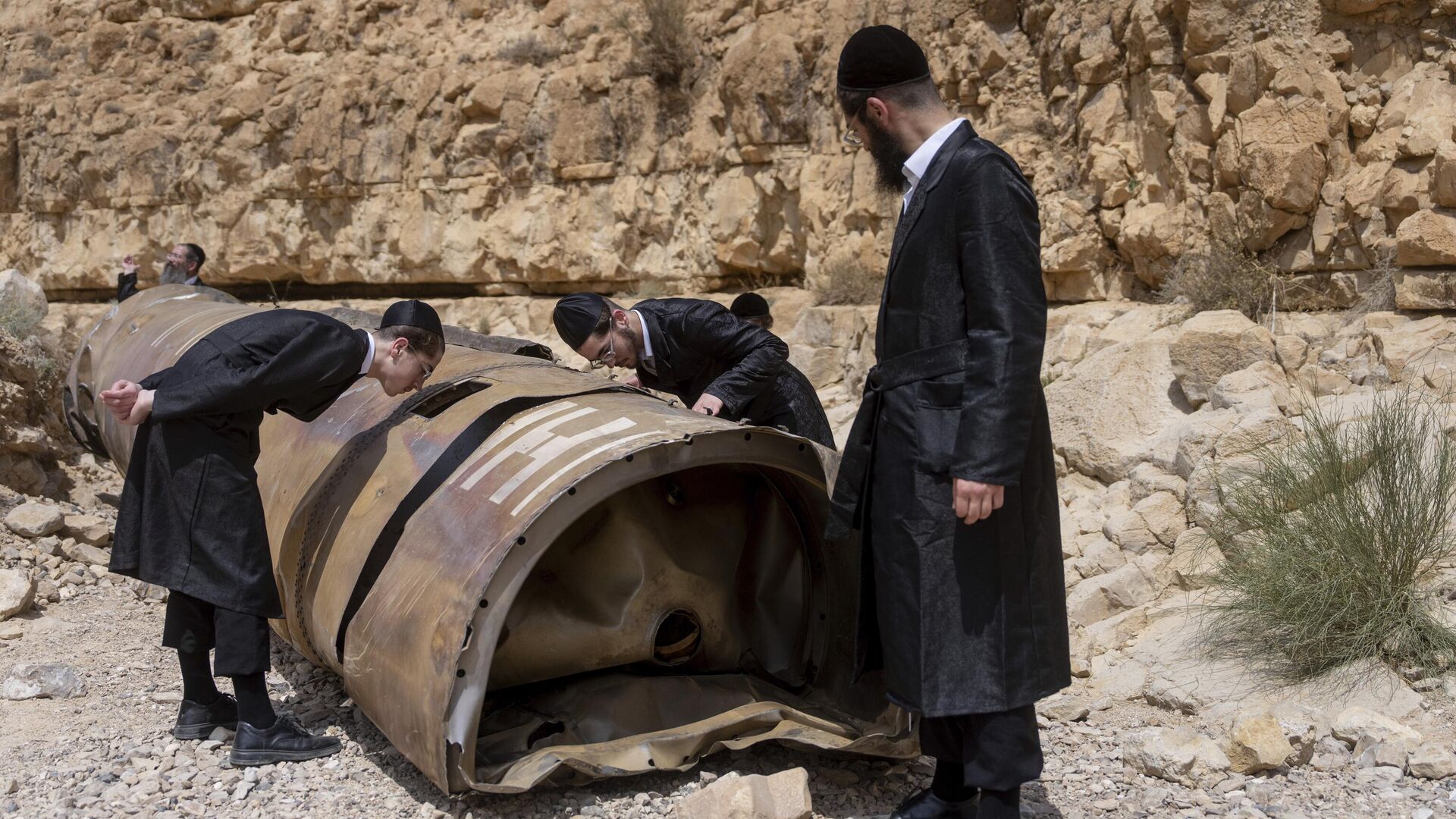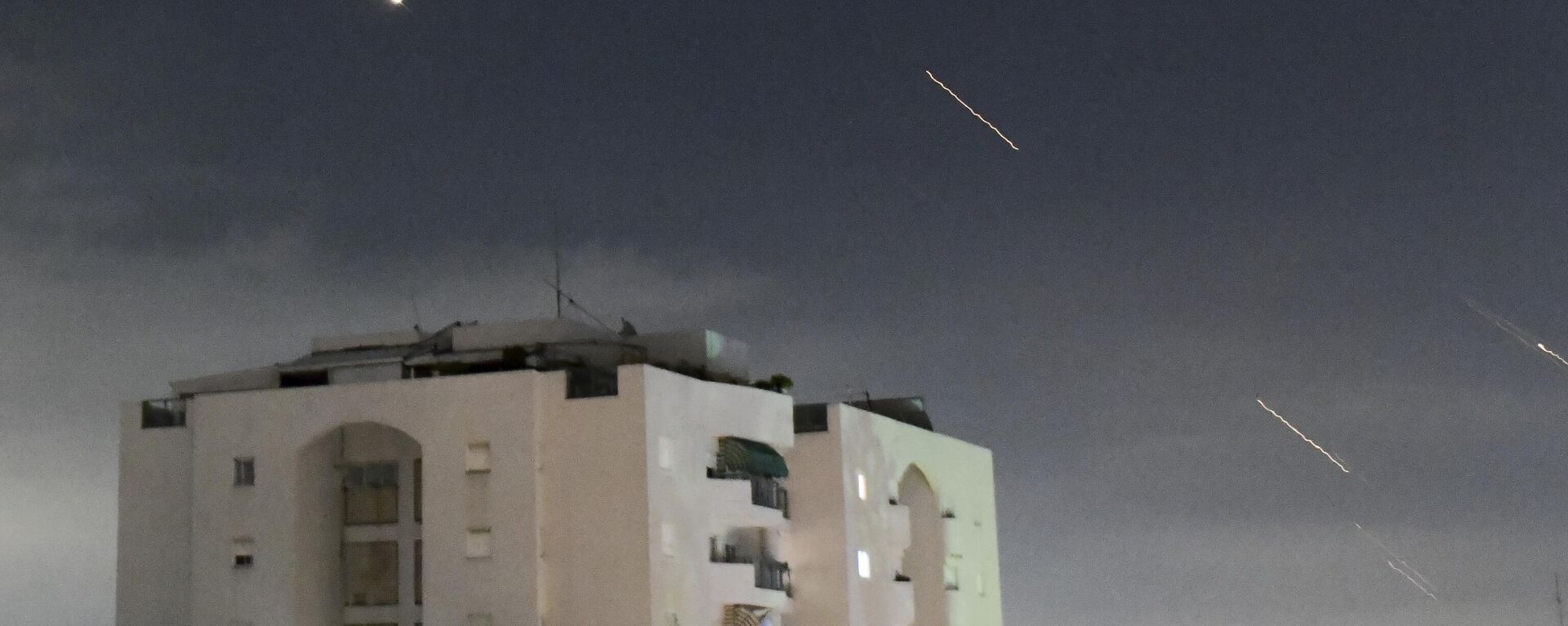https://sputnikglobe.com/20240811/jittery-over-looming-iranian-retaliation-israeli-officials-warn-of-potential-preemptive-strike-1119724394.html
Jittery Over Looming Iranian Retaliation, Israeli Officials Warn of Potential ‘Preemptive Strike’
Jittery Over Looming Iranian Retaliation, Israeli Officials Warn of Potential ‘Preemptive Strike’
Sputnik International
The suspected Israeli assassination of Hamas chief peace negotiator Ismail Haniyeh during the latter’s visit to Tehran on July 31 has left the Middle East and the world holding its breath in anticipation of an Iranian retaliation and a possible escalation of raging tensions into a full-scale regional war.
2024-08-11T14:29+0000
2024-08-11T14:29+0000
2024-08-11T14:29+0000
world
ismail haniyeh
benjamin netanyahu
middle east
americans
israel
tehran
iran
hezbollah
hamas
https://cdn1.img.sputnikglobe.com/img/07e8/08/0b/1119724596_0:160:3072:1888_1920x0_80_0_0_09071780c03e625428725ecbbc7cd2a7.jpg
Israel isn’t ruling out “preemptive” aggression against Iran as it awaits Tehran’s promised response to the killing of Ismail Haniyeh, Israel’s Ynet newspaper has reported, citing a source in Jerusalem said to be familiar with the discussions.“We will not wait and try to intercept the attack in the air, that will be the second stage, the anonymous source said, saying a preventative attack to thwart Iran’s offensive capabilities was one of Israel’s potential options.Even if Israel received definitive intelligence on Iran’s plans, a great deal would depend on whether this intelligence was shared between Israel and the United States, according to the source. “The option of a preemptive strike ultimately also depends on operational feasibility, whether it’s there or not,” the source said.A great deal will depend on what kind of action Iran decides to, according to the source, since Iran is capable of both a slow-moving operation that could reach Israel in three to five hours, or a speedy retaliation “that takes 12 minutes to arrive.”“They have these two capabilities. A distinction must also be made between an attack that comes from Iran and an attack that comes from Hezbollah, separate or combined. There’s also a distinction between an attack against civilian sites and one against military targets,” the source said.The source added that the increasingly thorny public-facing relationship between Prime Minister Netanyahu and President Biden isn’t worth paying attention to, and that the Israeli-US relationship is “good and strong,” because the Americans recognize that “if Israel loses and doesn’t achieve the goals of the war, it won’t be just us losing, but the Americans also losing.”According to Ynet’s source, the threat of a regional war could come about if Israel fails to intercept an Iranian attack – if its countermeasures fail to work properly. “Then we will have to react severely and harshly,” they said, without elaborating.The source suggested that the feeling in Israeli policy circles is that Iran and Hezbollah want to extract revenge for Israel’s assassination spree, but neither have a desire “to lead to an all-out war.”An IDF spokesperson told Ynet that the military “has plans” for potential preemptive aggression, and “a high level of readiness for its execution,” and that “any instruction we receive from the political level will be carried out immediately.”On Saturday, Ynet’s English-language edition reported that Washington has been privately urging Tel Aviv to refrain from any preemptive attack, and that Israel has heeded the warnings due to Iran’s size and distance, which may become “unsustainable” for Israel to handle if a full-scale exchange of hostilities takes place. Similarly, if Israel were to launch preemptive aggression against Hezbollah in Lebanon, it could drag Iran and its allies into the conflict, something the US also reportedly isn’t interested in.Iran has vowed to make Israel pay dearly for the July 31 assassination of Hamas chief Ismail Hainyeh in Tehran.“In line with the defense of its national security, territorial integrity, and national sovereignty, the Islamic Republic of Iran will legitimately and decisively make the oppressive Israeli regime pay the price for its aggression under international law and procedures as well as the UN Charter,” interim Iranian Foreign Minister Ali Bagheri Kani told his Belgian counterpart Hadja Lahbib in a telephone call on Saturday.Iran has an array of options for responding to the July 31 aggression, including a repeat of its April 13 missile and drone strike, which struck an Israeli intelligence-gathering facility and an airbase stationing the aircraft that launched the attack on the Iranian Embassy compound in Damascus on April 1. Israel and its allies played down the success of the April 13 strikes, boasting that “99 percent” of the drones and missiles fired by Iran had been shot down by a coalition speedily assembled to protect Israel. However, the demonstrative attack proved Iran’s ability to target Israeli military sites, and defense sources have told Iranian media that the nation’s newest, fastest and most capable missiles were not used in the April attack.Iran and its regional Axis of Resistance partners could also launch a coordinated retaliation, something hinted at by Houthi leader Abdul Malik al-Houthi in a televised address on Thursday.Alternatively, the Islamic Republic could retaliate in a tit-for-tat manner to Israel’s long-running strategy of assassinations by attempting to target senior Israeli political and military leaders –something the Islamic Republic has generally refrained from doing in the past.
https://sputnikglobe.com/20240414/strike-on-israel-shows-us-bases-near-iran-are-achilles-heel---analyst-1117924035.html
israel
tehran
iran
Sputnik International
feedback@sputniknews.com
+74956456601
MIA „Rossiya Segodnya“
2024
News
en_EN
Sputnik International
feedback@sputniknews.com
+74956456601
MIA „Rossiya Segodnya“
Sputnik International
feedback@sputniknews.com
+74956456601
MIA „Rossiya Segodnya“
will iran respond to israel, how will iran retaliate to israel, how will iran respond, will israel strike iran preemptively
will iran respond to israel, how will iran retaliate to israel, how will iran respond, will israel strike iran preemptively
Jittery Over Looming Iranian Retaliation, Israeli Officials Warn of Potential ‘Preemptive Strike’
The suspected Israeli assassination of Hamas chief peace negotiator Ismail Haniyeh during the latter’s visit to Tehran on July 31 has left the Middle East and the world holding its breath in anticipation of an Iranian retaliation and a possible escalation of raging tensions into a full-scale regional war.
Israel isn’t ruling out “preemptive” aggression against Iran as it awaits Tehran’s promised response to the killing of Ismail Haniyeh, Israel’s Ynet newspaper has
reported, citing a source in Jerusalem said to be familiar with the discussions.
“We will not wait and try to intercept the attack in the air, that will be the second stage, the anonymous source said, saying a preventative attack to thwart Iran’s offensive capabilities was one of Israel’s potential options.
“You have to understand that not everything is possible, you don’t know everything in advance. It really depends on where the attack will come from, what type of attack it will be, how strong it will be and where it will be directed. But the option of a preemptive attack – deterrence in the sense of [targeting] the site from which the attack is going to be carried out – is on the table,” the source said.
Even if Israel received definitive intelligence on Iran’s plans, a great deal would depend on whether this intelligence was shared between Israel and the United States, according to the source. “The option of a preemptive strike ultimately also depends on operational feasibility, whether it’s there or not,” the source said.
A great deal will depend on what kind of action Iran decides to, according to the source, since Iran is capable of both a slow-moving operation that could reach Israel in three to five hours, or a speedy retaliation “that takes 12 minutes to arrive.”
“They have these two capabilities. A distinction must also be made between an attack that comes from Iran and an attack that comes from Hezbollah, separate or combined. There’s also a distinction between an attack against civilian sites and one against military targets,” the source said.
“At the current stage, the reason for panic stems from the public’s lack of awareness and our inability to inform the public of our capabilities, our intelligence and what the threat level is. It’s also difficult to do so because there are things you don’t want the enemy to know about what you know. So there is a price you pay – that part of the population has feelings of discomfort and fear,” the person said.
The source added that the increasingly thorny public-facing relationship between Prime Minister Netanyahu and President Biden isn’t worth paying attention to, and that the Israeli-US relationship is “good and strong,” because the Americans recognize that “if Israel loses and doesn’t achieve the goals of the war, it won’t be just us losing, but the Americans also losing.”
According to Ynet’s source, the threat of a regional war could come about if Israel fails to intercept an Iranian attack – if its countermeasures fail to work properly. “Then we will have to react severely and harshly,” they said, without elaborating.
The source suggested that the feeling in Israeli policy circles is that Iran and Hezbollah want to extract revenge for Israel’s assassination spree, but neither have a desire “to lead to an all-out war.”
An IDF spokesperson told Ynet that the military “has plans” for potential preemptive aggression, and “a high level of readiness for its execution,” and that “any instruction we receive from the political level will be carried out immediately.”
On Saturday, Ynet’s English-language edition
reported that Washington has been
privately urging Tel Aviv to refrain from any preemptive attack, and that Israel has heeded the warnings due to Iran’s size and distance, which may become “unsustainable” for Israel to handle if a full-scale exchange of hostilities takes place. Similarly, if Israel were to launch preemptive aggression against Hezbollah in Lebanon, it could drag Iran and its allies into the conflict, something the US also reportedly isn’t interested in.
“Gone are the days when Israel dealt individually with each element of the…Shiite axis. Any Israeli initiative could now provoke a war with the entire bloc led by Iran,” Ynet contributor Ron Ben-Yishai wrote Saturday’s piece.
Iran has vowed to make Israel pay dearly for the July 31 assassination of Hamas chief Ismail Hainyeh in Tehran.
“In line with the defense of its national security, territorial integrity, and national sovereignty, the Islamic Republic of Iran will legitimately and decisively make the oppressive Israeli regime pay the price for its aggression under international law and procedures as well as the UN Charter,” interim Iranian Foreign Minister Ali Bagheri Kani
told his Belgian counterpart Hadja Lahbib in a telephone call on Saturday.
Iran has an array of options for responding to the July 31 aggression, including a repeat of its April 13 missile and drone strike, which struck an Israeli intelligence-gathering facility and an airbase stationing the aircraft that launched the attack on the Iranian Embassy compound in Damascus on April 1. Israel and its allies played down the
success of the April 13 strikes, boasting that “99 percent” of the drones and missiles fired by Iran had been shot down by a coalition speedily assembled to protect Israel. However, the demonstrative attack proved Iran’s ability to target Israeli military sites, and defense sources have told Iranian media that the nation’s newest, fastest and most capable missiles were not used in the April attack.
Iran and its regional Axis of Resistance partners could also launch a coordinated retaliation, something hinted at by Houthi leader Abdul Malik al-Houthi in a televised address on Thursday.
Alternatively, the Islamic Republic could retaliate in a tit-for-tat manner to Israel’s long-running strategy of assassinations by attempting to target senior Israeli political and military leaders –something the Islamic Republic has generally refrained from doing in the past.



